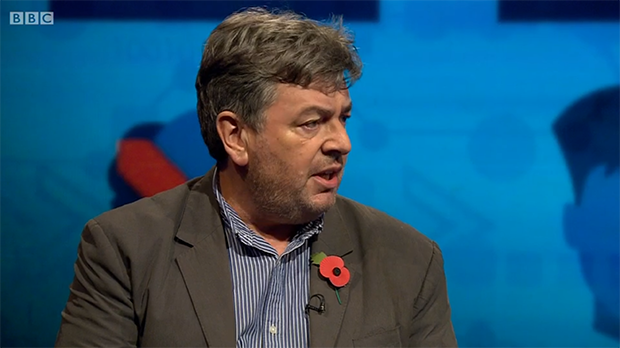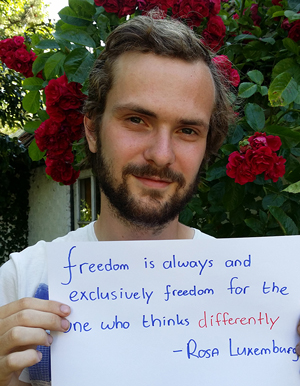2 Nov 2015 | Academic Freedom, Europe and Central Asia, mobile, News and features, United Kingdom

One of the truly great things about being a student used to be the exposure university life gave you to all sorts of views — absurd and otherwise — and being able to decide for yourself what to make of them. Students were once known for their dedication to free speech and academic freedom, epitomised by the Free Speech Movement at the University of California, Berkeley, 1964-65.
In 2015, students are more renowned for the practice of trying to ban anyone they believe to have dangerous views in order to protect fellow tutees, whether it’s removing the Sun from the shelves or refusing airplay to Robin Thicke’s Blurred Lines. We witnessed this tendency most recently with the petition to ban Germaine Greer from speaking at Cardiff University because of her “misogynistic views towards trans women”.
Index on Censorship chairman David Aaronovitch appeared on BBC Newsnight on Thursday to debate free speech at universities with Toke Dahler, a representative of Leeds University student union. Dahler said that “it’s up to students” to decide where the threat lies, and it is the student union’s responsibility to then “make sure that students feel safe and feel welcome”.
For Aaronovitch, student unions should be places of lively debate and discussion, rather than places where students are “hermetically sealed away behind a form of intellectual rampart within which they can feel safe”. The problem with Dahler’s view, said Aaronovitch, is one of definition. What do we mean by safe? Who exactly feels unsafe? And what do they feel unsafe from?
The full interview is available on BBC iPlayer until 28 November. You can watch it here (starts at 27:40).
19 Oct 2015 | Asia and Pacific, China, mobile, News and features

(Photo illustration: Shutterstock)
With UK-China relations warming, the president of the People’s Republic of China, Xi Jinping, will pay a state visit to the UK from 20-23 October. The UK government hopes the visit will help finalise multibillion-pound deals for Chinese state-owned companies to contribute to the building of two British nuclear power plants.
Many — including the Dalai Lama — are concerned that Prime Minister David Cameron and Chancellor George Osborne are putting the desire for profit above concern for human rights.
Xi may be staying in luxury at Buckingham Palace during his visit, but here are just five examples of how respect for free speech in China doesn’t get past the front door:
1. Locking up artists
The soccer-loving Chinese president is due to visit Manchester City Football Club’s stadium with Cameron during his visit. But will he make time for the new exhibition by Chinese artist and dissident Ai Weiwei in London? We won’t hold our breath.
The major retrospective of the artist’s work is currently on show at the Royal Academy of Arts. Ai — whose work is famous for addressing human rights abuses and corruption — has been harassed, beaten, placed under house arrest and imprisoned.
The current London exhibition almost didn’t go ahead as the British Embassy in Beijing turned down Ai’s request for a business visa in connection with his criminal conviction for tax fraud — an accusation he denies. British Home Secretary Theresa May eventually overturned the embassy’s decision, but only after a mass public outcry. This shouldn’t be the height of the British government’s efforts to address Chinese human rights abuses.
2. The use of online “opinion monitors”
China’s Terracotta Army, the 8,000-strong force of sculptures depicting warriors and horses, was purpose-built to protect emperor Qin Shi Huang, who died in 210 BC, in his afterlife. In the modern day, China’s army of “opinion monitors”, which has been purpose-built to protect China’s current leaders from criticism and dissent, dwarfs anything the Qin dynasty could muster.
Last year, Index on Censorship reported that the Chinese government is expanding its censorship and monitoring of web activity with a new training programme for an estimated two million flies on the firewall.
China’s hundreds of millions of web users increasingly use blogs to condemn the state, but posts are routinely deleted by government employees. In 2012, monitors banned more than 100 search terms relating to the 25th anniversary of the Tiananmen Square protest of 1989 and even shut down Google services.
3. Banning books
Often overshadowed by China’s internet censorship, we shouldn’t forget that Chinese authorities have a rich history of restricting free expression in literature. In 1931, Lewis Carroll’s Alice’s Adventures in Wonderland was banned for its portrayal of anthropomorphised animals for fear children would regard humans and animals as equal. During Chairman Mao Zedong’s Cultural Revolution, all aspects of arts and culture had to promote and aid the revolution. Libraries full of historical and foreign texts were destroyed and books deemed undesirable were burned.
The country’s post-Mao transition has been marked by a commitment to “modernising”. While the Chinese populace has access to more information than ever before, their leaders’ continuation of banning books on grounds of non-conformity and deviance are anything but modern.
Publications which are still banned — often for perceived politically incorrect content — include the memoirs of Li Rui, a retired Chinese politician and dissident who caused a stir in the CCP by calling for political reform; Lung Ying-tai’s Big River, Big Sea about the Chinese Civil War; and Jung Chang’s best-selling Wild Swans, a history that spans a century, recounting the lives of three female generations in the author’s family.
4. Detaining activists
Recent years have been marked with an intensification of the crackdown on dissent. On 6 March 2015, just days before International Women’s Day, the Chinese government detained a number of high-profile feminist activists. They were accused of creating a disturbance and, if convicted, could have received three-year prison sentences.
The women had been linked to several actions over the years which highlight issues such as domestic violence and the poor provision of women’s toilets, obvious embarrassments to the authorities.
As a result of their detention, China’s small, but increasingly vocal feminist movement was dealt a heavy blow. Demonstrations were cancelled and debate was effectively silenced. Five of the activists were released fairly quickly, but five more were in prison until 13 April, with two being denied treatment for serious medical conditions while in custody.
5. Repressing Uyghur Muslims
China continues to persecute the largely Muslim minority Uyghurs of Xinjiang. A tough system of policies and regulations deny Uyghurs religious freedom and by extension freedom of expression, association and assembly.
The abuse of national security and anti-terror laws to persecute Uyghurs and further deny them freedom of expression was highlighted in the recent ban by the Chinese authorities on 22 Muslim names in Xinjiang in an apparent attempt to discourage extremism among the region’s Uyghur residents. Many children were barred from attending school unless their names were changed.
Ryan McChrystal is the assistant online editor at Index on Censorship
7 Oct 2015 | About Index, Campaigns, Statements
“We condemn the decision to summons Bahar Moustafa to court. Media reported on October 6 that Mustafa — who once wrote a tweet with the hashtag #KillAllWhiteMen — had received a court summons for malicious communications. Although we do not have the full details for this summons, it is clear that this particular remark by Mustafa posed no direct and imminent danger to anyone – and this is the only test that must be applied when considering limits to free expression. The charges demonstrate once again the problems with this piece of legislation, and others that criminalise free speech, and the way in which these laws are interpreted,” Jodie Ginsberg, CEO of Index on Censorship said.
Mustafa, an employee of the independent students’ union at Goldsmiths, University of London, has been ordered to appear at Bromley Magistrates’ Court on 5 November related to sending a threatening message between 10 November 2014 and 31 May this year, and one of sending a menacing or offensive message via a public network, between the same dates.
19 Aug 2015 | mobile, Netherlands, News and features, Youth Board
This is the sixth of a series of posts written by members of Index on Censorship’s youth advisory board.
Members of the board were asked to write a blog discussing one free speech issue in their country. The resulting posts exhibit a range of challenges to freedom of expression globally, from UK crackdowns on speakers in universities, to Indian criminal defamation law, to the South African Film Board’s newly published guidelines.

Ravian Ruys is a member of the Index youth advisory board. Learn more
“Haat imam” is a man whose life solely depends on the complete destruction of western values and interests, or so one would think if you were reading or watching the Dutch media.
It is a word used whenever we are talking of an imam whose views are considered either too conservative or too radical. In most cases, when someone is labelled a haat imam, they are subject to protest or no-platforming. In 2015, there have been three known cases of events being cancelled because some of the speakers were labelled haat imams. In these incidences, the individuals involved were investigated by Dutch security services and considered safe, meaning they were found to have no known links to terrorist organisations.
All this has led the Volkspartij voor Vrijheid en Democratie (People’s Party for Freedom and Democracy), a political party currently in power, to advocate a blacklist for radical preachers. The party warns that this blacklist should not only include those Muslim preachers who have known links to terrorist organisations, but also those who spread hate.
This means public pressure leads to the narrowing of freedom of speech for one specific group of people. It has also created a feeling of persecution surrounding young Muslims, made even worse by the deputy prime minister quoting flawed scientific research stating that 80 per cent of young Dutch-Turks support ISIS.
If you are a Muslim in the Netherlands, you are now in an environment where you feel you must be the nicest Muslim anyone has ever met or you can’t be trusted. Perversely, this lack of trust is often quoted as one of the things that drives young Muslim men and women into the arms of extremist organisations. Consequently, a policy trying to protect us against extremist propaganda works in favour of the extremists.
The Netherlands has a great reputation when it comes to freedom of speech and we should keep it that way. This means creating a fair and equal space for Muslims in our country to debate their religion on their terms. We might not always like what we hear, but we cannot intervene directly unless a direct threat is made against innocents. If we do not trust those involved, in other words, if we do not trust our fellow countrymen, how can we expect their trust in return?
Without trust, politics and civil society become a bloody mess.
Ravian Ruys, The Netherlands
Related:
• Muira McCammon: GiTMO’s linguistic isolation
• Jade Jackman: An act against knowledge and thought
• Harsh Ghildiyal: Defamation is not a crime
• Tom Carter: No-platforming Nigel
• Matthew Brown: Spying on NGOs a step too far
• About the Index on Censorship youth advisory board
• Facebook discussion: no-platforming of speakers at universities



